William Eadie, Marion's father, was the third son of a family which grew to five sons and two daughters. The eldest son, James, emigrated to the United States. The second son, John, became famous for working in the design department of the Glasgow carpet company Templeton's until the age of 85. Robert, the fourth son, achieved international recognition as an artist and book illustrator.
William also went to America and did well. He is reputed to have arrived at San Francisco on the day before the great earthquake of 1906. He was initiated into the Hampden Lodge of freemasons at Springfield, Mass., in May of 1910. When war broke out in Europe, he returned to Scotland. Too old for military service at 37, he used his engineering talents in the shipbuilding industry on the Clyde. He married Jenny Fisher the following year, and Marion was born in July of 1918.
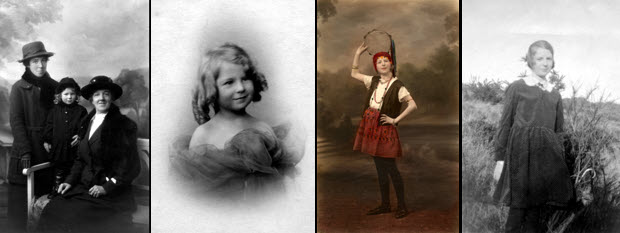
Marion with her mother and maternal grandmother; Marion at 3½; the early years
The war ended and Germany went through its period of hyperinflation in the early 1920s. The United States experienced its own financial agony in 1929, when the economy collapsed and the bank, where William had left his savings, went bust. The shipbuilding industry went into recession and William lost his job.
There were hard times for Marion and her family during her teenage years. She had to attend Sunday school as well as weekday school, winning certificates in the years 1929-33, and she even signed The Pledge; but as this happened many years before she was eligible to consume alcohol legally, she felt entitled to disregard the promise to remain teatotal. Especially when there was a glass of wine on offer at dinnertime or her favourite tipple: blue curaçao with bitter lemon.
Some of her prizes took a more useful form. The family archive still contains a copy of England Before The Restoration by Lord Macaulay, a Band of Hope prize awarded for elocution at John Street Church when Marion was 14, and a 1931 edition of The Stars In Their Courses by Sir James Jeans, M.A., D.Sc., Sc.D., LL.D., FRS, a Girl's Own Paper competition prize.
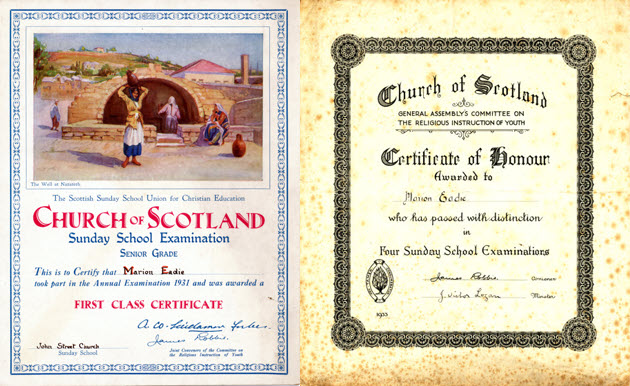
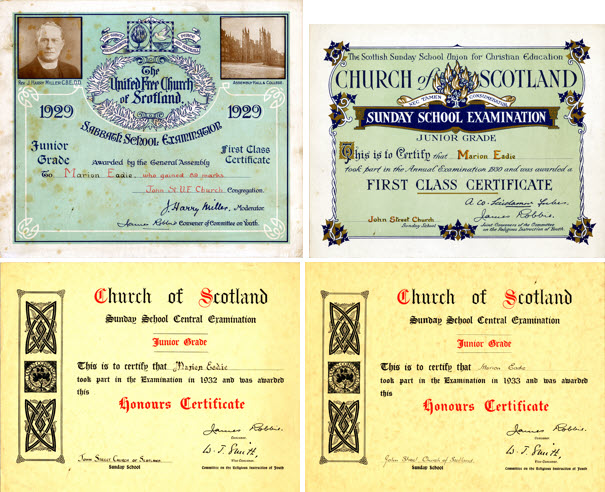
Marion did well at weekday school but, like Harry Turner, her husband-to-be, she had no hope of further education. For Marion, it was a question of leaving school at the earliest age possible and moving into the world of work; in her case, an office job at Glasgow's Transport Department; but, like her husband-to-be, Marion had thirst for knowledge, which could be satisfied, in part, by attended evening classes, and which also drove both of them to form or join groups of like-minded young people; a forum where their opinions could be expressed.
Marion and some friends formed a junior branch of the British Astronomical Association and persuaded Sir James Jeans (a physicist, mathematician and astronomer, who became known as a writer of popular books on astronomy) to become the Junior Astronomical Association's patron. Marion's literary talents were turned to the roles of editing the society's journal, Urania, and contributing articles to it.
Marion joined the Workers' Education Association and, as a member of the Art of Writing Group, had work published in their journal, In Print. She also entered the annual Corporation of the City of Glasgow Art Galleries & Museums Drawing Competitions, winning the Silver Medal in 1931 and achieving a Highly Commended award in 1930 and 1932.

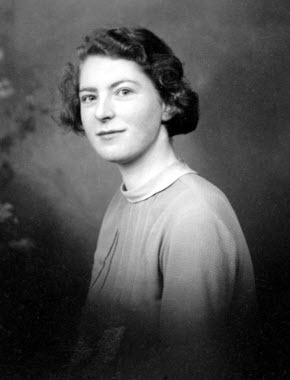 The 1930s were a time of great interest in things celestial, some of it fuelled by the growing science fiction fandom cult. American 'pulp' magazines were arriving in Britain as ballast in ships, and there was growing interest in rockets and space travel. The 1930s were a time of great interest in things celestial, some of it fuelled by the growing science fiction fandom cult. American 'pulp' magazines were arriving in Britain as ballast in ships, and there was growing interest in rockets and space travel.
Urania began to receive articles from rocketry enthusiasts in Manchester, and Arthur C. Clarke, then living in London, persuaded Marion that Urania needed an astronautics section, which became a home for articles written by himself and Eric Burgess, a Manchester-based rocketry enthusiast and co-founder of the Manchester Interplanetary Society. Harry Turner was another MIS member and editor of its journal.
Harry's articles for Urania were on astronomical themes and he and Marion found that they were kindred spirits. They exchanged many letters, Harry became the treasurer of the JAA, Marion also took on the role of secretary to the Scottish branch of the British Astronomical Association and they met for the first time at the 1938 Empire Exhibition in Glasgow.
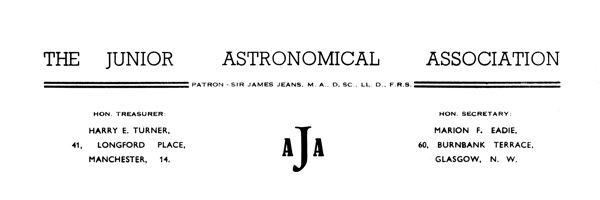

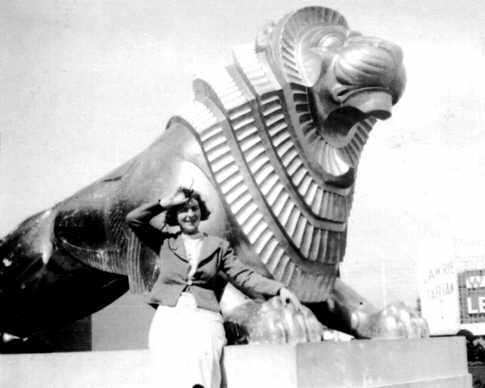
Marion F. Eadie, president of the Junior Astronomical Association and editor
of its journal, Urania, at the 1938 Empire Exhibition in Glasgow
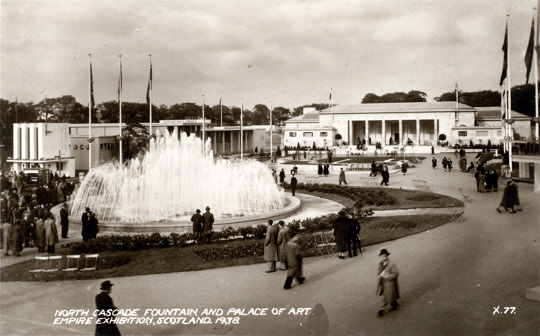
1938 Glasgow Empire Exhibition postcard
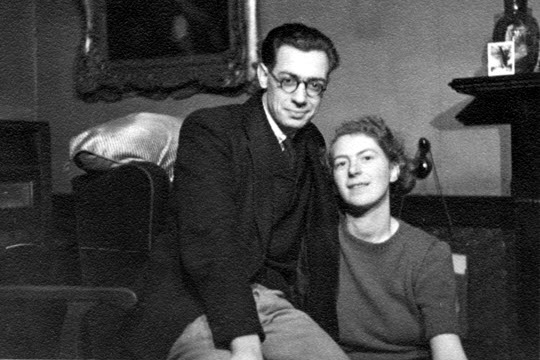
Harry Turner with Marion at her Glasgow home, Christmas 1940
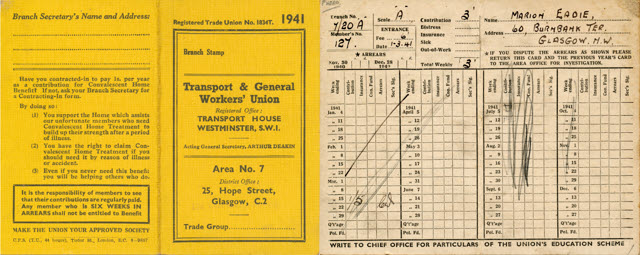
Marion Eadie's TGW membership card, 1941
Marion divided her time between Scotland and England in the early part of World War II. Harry's parents rented a very large house in Victoria Park, Manchester. Harry's mother filled some of the spare rooms with lodgers, so it was easy to add Marion to the roll of residents. The house has twin attics, which had been the home of the Manchester Interplanetary Society and which became a popular meeting place for science fiction fans who were visiting Manchester. [pictures of lots of them here]
Urania underwent a redesign at Harry's hands and the couple began a new publishing venture; a science-fiction fanzine called Zenith. Marriage was on the cards, and it happened in 1942, rushed forward by the RAF's sudden demand for Harry's services.
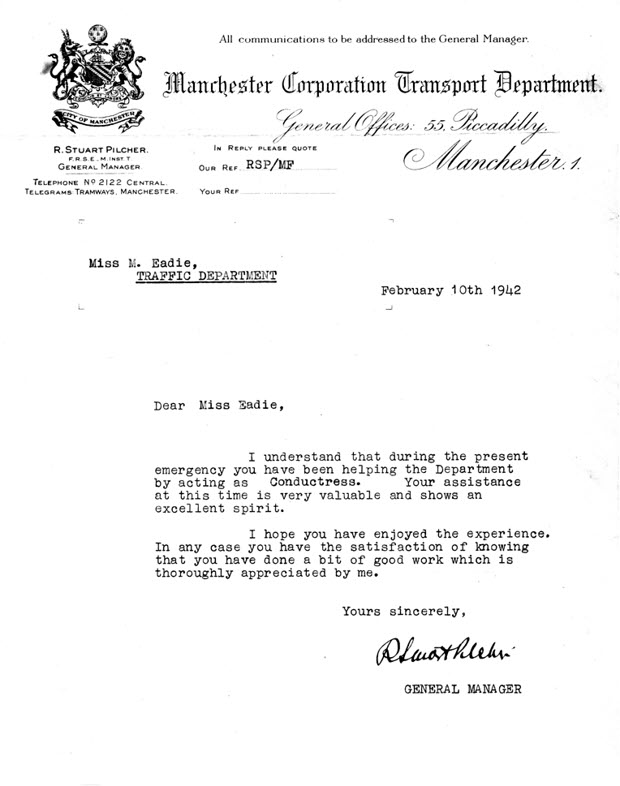
After completing his training, Harry was assigned to the task of keeping the radar station on England's south and south-east coasts in repair and able to track German bombing raids. Married life became episodic; done by correspondence between Harry's leaves and the occasions when he was able to wangle extra time off.
The war in Europe ended in May 1945, about 3 weeks before the birth of Marion and Harry's first son, Philip, who was named after Harry's favourite author, Philip E. Cleator. Harry's hopes of getting back into civilian life were dashed when the RAF decided to send him and lots of other unfortunates to southern India to maintain radar stations on mountains 6,000 feet high. The focus of the war had shifted to Japan.
That final part of the war ended almost as soon as Harry & Co. landed in India, but the wartime coalition had been replaced by a Labour government and the Indians were agitating for independence. So the new regime in Britain decided to keep the troops there for as long as possible, and Harry did not part company with the RAF until the latter half of 1946.
A year later, Marion and Harry bought their first house; on Willow Bank in Moston, Manchester. Taking possession involved a scramble to avoid having it confiscated by the local council as unoccupied. A second son, William, was born conventionally in hospital. The third son, Robert, was a home birth.

Nice thing to find taped to the front door of YOUR house!
Harry switched careers from rubber chemist at the Anchor Chemical Company in Clayton, Manchester, to advertising. He used his skills as a graphic artist to establish and then manage a new advertising department at Redfern's Rubber Works in Hyde, and the family moved to a new home in nearby Romiley.
Two years later, Marion's mother died and the house next door, the other half of a pair of semis, became available. The Turners were able to buy it as a home for both Harry's parents and Marion's elderly Aunt Marion, who survived her younger sister by just ten months.
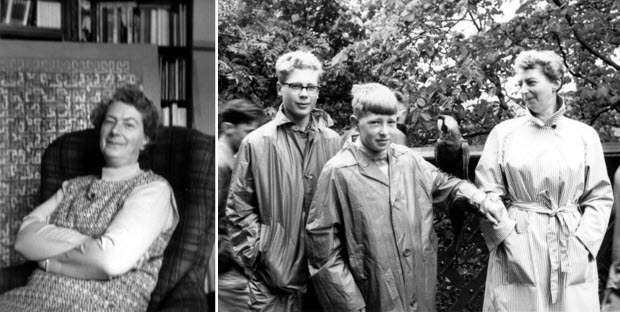
Marion at home in Romiley; with Bill and Robert
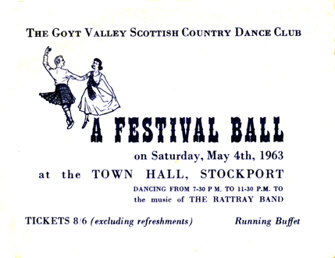 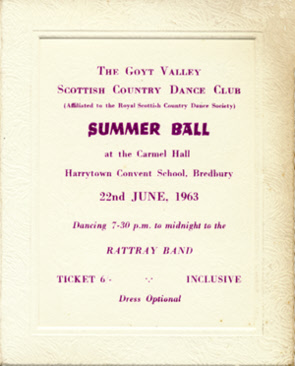
Tickets/programmes for events held by Goyt Valley Scottish Country Dance Club in 1963
The senior Turners embraced the cultural life in their new home; Marion joined the Goyt Valley Scottish Country Dance Club and Harry became a member of the Beeches Arts Group and began to exhibit his work locally. Their children grew up and started their own lives. Harry's parents went to their respective rewards, his father at the start of his 86th year, his mother five years later in 1975. Marion's writing career was about to take off and she needed somewhere quiet to do homework for her evening classes, which included studying language and dressmaking, and Harry needed space for his new hobby of screen printing as well as room to paint large canvases. And the family needed accommodation for visiting children and their companions.
Selling the house next door was put off the agenda and Marion and Harry found themselves living in what amounted to a 6-bedroom detached house. Both houses survived the "earthquake of the century", which took place two days before Marion's birthday in 1984. Marion reported seeing Harry's set of Encyclopaedia Britannica (oriented east-west) rippling in the lower part of a bookcase and hearing the doors of a storage unit above it rattling as if a heavy lorry was crashing along Carlton Avenue.
The eclipse cruise in 1973 sparked off a hidden travel bug – holidays in and cruises to France, Norway, the Isle of Man, Mull & Iona, the Channel Islands, Orkney, the Scottish Highlands, Stornoway, the Land of the Midnight Sun, Iceland and a canal trip in and around Oxford followed.

Both Marion and Harry did battle with health problems as old age arrived. They joined in with the Computer Age enthusiastically in the 1990s, retiring typewriters in favour of a method of storing, editing and printing information in a much better way. They acquired a second-hand 386, which was well up to the task of running WordPerfect 6 for DOS, the best word processing program of all time, and then a P90 Pentium with a bigger hard disk drive, which could cope with the graphics of Harry's more ambitious projects.
Computing became a standard daytime activity, which meant that Marion was sitting at her computer, adding notes to one of her archives, when the October earthquake of 2002 struck. She felt that her gas-lift typing chair was about to collapse during the brief shaking!
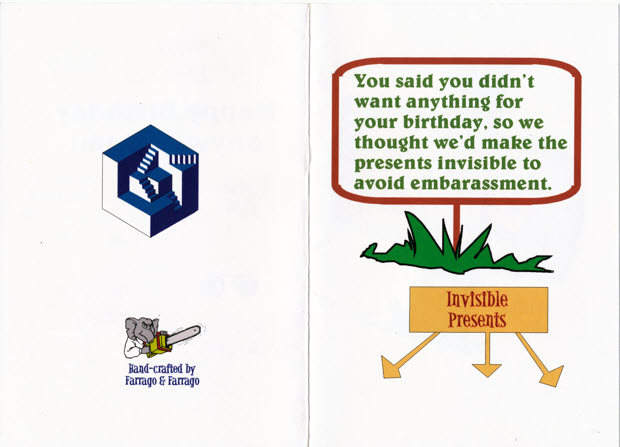
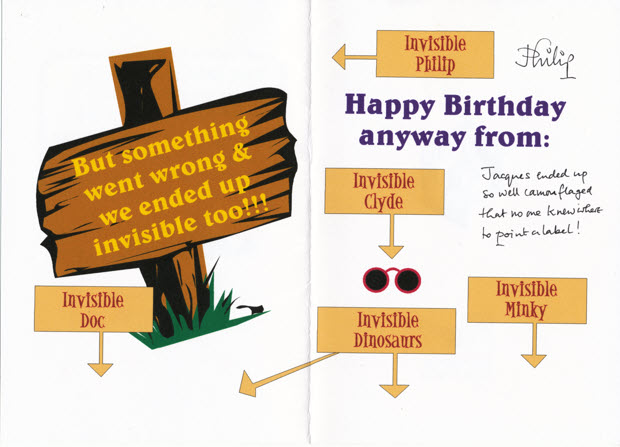
Like her mother, Marion was an accomplished knitter and dress-maker. She also became proficient at baking bread, a skill which she passed on to Philip, and both of them became able to knock out loaves which were vastly superior to anything available elsewhere in Romiley. For many years (until she hit the compulsory retirement age), Marion was an active member of the WRVS, offering her talents on the preparation side to the local Meals On Wheels service.
A new century began – a year after the date on which moronic politicians around the world celebrated its arrival. When Harry suffered a stroke, from which he made a fair recovery, in 2004, Marion began to wonder if the pair of them would end up in an old folks' home. But they had had the foresight to raise a son who was a writer, who could put his own life on hold at a moment's notice when his parents needed a helping hand. It was a recipe for survival seasoned with phone calls from more distant family members and visits.
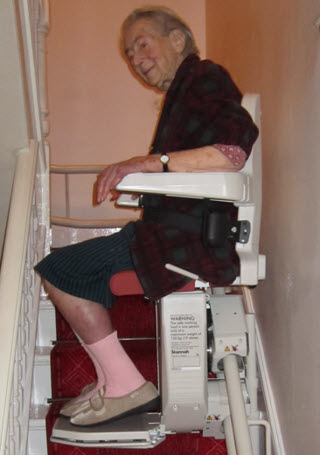 Marion was still quite active when Harry died at the beginning of 2009. A fall in her 94th year resulted in a half-hip operation to repair the damage. A general anaesthetic was ruled out because of the patient's age, and she was able to enjoy the cheerful chatter of the surgical team as well as the necessary hammering and banging noises. Heart problems were detected during Marion's stay in hospital and she arrived home with a pacemaker fitted. She was able to spend her remaining three years in her own home; now reduced to the original half of the pair of semis. Marion was still quite active when Harry died at the beginning of 2009. A fall in her 94th year resulted in a half-hip operation to repair the damage. A general anaesthetic was ruled out because of the patient's age, and she was able to enjoy the cheerful chatter of the surgical team as well as the necessary hammering and banging noises. Heart problems were detected during Marion's stay in hospital and she arrived home with a pacemaker fitted. She was able to spend her remaining three years in her own home; now reduced to the original half of the pair of semis.
She was helped by a stair-lift (which gave her access to the whole house), equipment provided by Stockport council's excellent social care department, the professional carers who arrived each morning to help her to wash and get dressed and have a chat with her, and the good offices of the local district nurses. She also had her "staff" of one, who took care of housework (apart from the washing up, which Marion insisted was her contribution), shopping, cooking (Marion was particularly fond of minipizza on a chiabata base [her invention] and orange jelly made with a tin of manadrin oranges from Aldi) and providing copies of the Daily Mail, the Sunday Telegraph and the Sunday Post.
Marion remained in charge of remembering when it was time to buy cards for family birthdays and a keen crossword puzzle solver. She was a fan of the cartoonists Matt (Sunday Telegraph) and Pugh (Daily Mail), but her first destination in the Daily Mail, on relevant days, was always the Peterborough column to find out if the "staff" had made a contribution to it. Shortly after her death at the age of 96, the "staff" set a new world record by appearing in Peterborough on consecutive days (in different sections).
So it goes. ■
|











